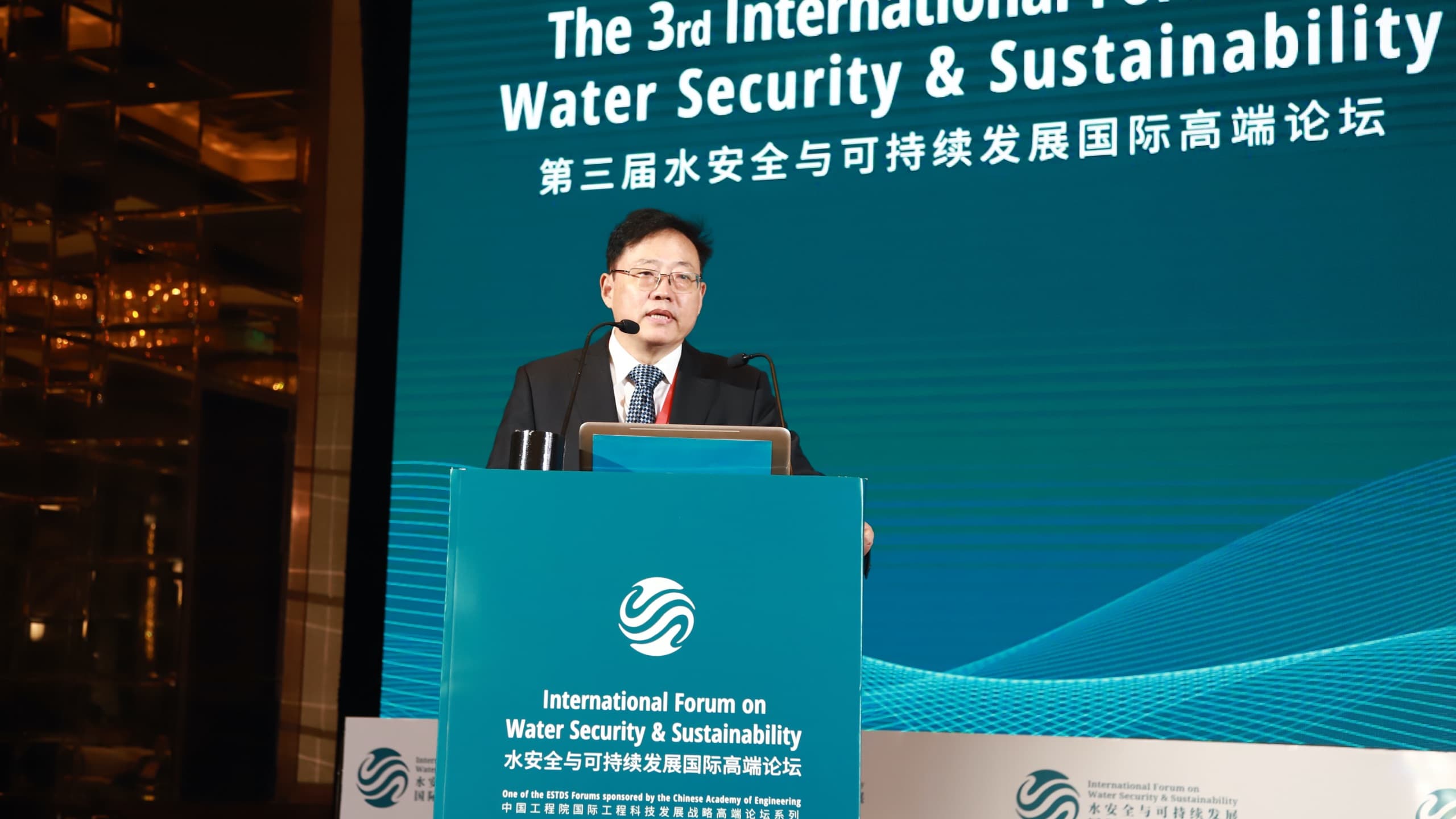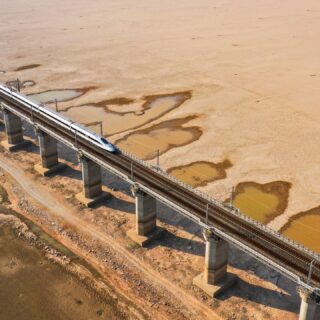Exclusive release · Prof Jianyun Zhang’s opening speech at the 3rd International Forum on Water Security and Sustainability
Why Water Security is an Imperative Topic
Playback
Dear Mr Mingshan Lei, Chairman of China Three Gorges Group,
Mr. Xianzhang Pan, Vice Governor of Jiangsu,
Mr. Yong Jiao, Former Chinese Minister of Water Resources, member of the NPC Standing Committee,
Mr. Shenglian Guo, Former Vice Governor of Hubei, Chair of Hubei Provincial Science and Technology Association,
Mr. Annan Wang, Chief Planner of the Chinese Ministry of Water Resources,
Mr. Jesseph Lee, President of the International Association for Hydro-Environment Engineering and Research,
Members of the Chinese Academy of Engineering,
Ladies and Gentlemen,
Good morning!
It’s such a pleasure that we are meeting again in Nanjing, the ancient capital, in a warm spring full of blossoms, to discuss the topic of water security and sustainability. First of all, please allow me, on behalf of the organising committee, to thank the Chinese Academy of Engineering, China Three Gorges Group, Chinese Hydraulic Engineering Society, and the Jiangsu Provincial Reform and Development Committee, the sponsors of this Forum. My sincere gratitude also goes to all the host organisations and members of the secretariat, for their great support to the Forum.
This Forum was scheduled for September 2020. However, because of the Covid pandemic, we had to postpone it till this April. Although this made us some difficulties, it also enables us to see the importance of water, and the absolute necessity to discuss the topic of water security. Therefore, my speech will be focusing on themes of this forum, water, water security, water management and sustainability.
We need to first remind ourselves that water security is a dire problem for not only China but also the entire globe. Ismail Serageldin, former vice president of the World Bank, warned in 1995 that “if the wars of this century were fought over oil, the wars of the next century will be fought over water — unless we change our approach to managing this precious and vital resource”.
Furthermore, global changes are fundamentally challenging water security. IPCC, the Intergovernmental Panel on Climate Change, reported in a latest report that 2020, although under a strong La Niña event and global lockdowns out of the pandemic, saw the global mean temperature 1.2 ± 0.1°C above the 1850–1900 baseline. Therefore, we are only 0.2 degree away from the 1.5°C target set by the Paris Agreement.
Meanwhile, global population is still on a rapid rise, averaging an annual increase of 1.1%. The increase put more pressure on water security through increased demand. Yet according to UN forecasts, most of the future population increase will happen in less developed regions, where water insecurity is a worrying problem out of the lack of infrastructures and institutions.
The global land use is also changing significantly. In the past 50 years, we have converted 70% of the land surface not covered by ice. China is a very good example in this regard, if we take a look at its urbanisation, which increased from 36.3% in 2000 to more than 60% in 2020. The piece of land under out feet, was still farming field or wasteland less than 20 years ago.
In our traditional understanding, an important assumption is that the earth system fluctuates within “an unchanging envelope of variability”. However, the global changes have shattered such stationarity, and therefore challenges our knowledge and institution in a fundamental way. Therefore, Prof. Dennis Lettenmaier and a few other scholars had this profound question for us all: “Stationarity is dead: whither water management?”
To properly manage water, we need to set straight property rights around it, on which Nobel Prize laureate, Elinor Ostrom, had her classic theory on. Water could be private goods or public goods, and sometimes even both. The management of this resources therefore unavoidably involves the balance between three social institutions, the government, the market and the community. On these topics, I believe Mr Lei, Dr Jiao, Mr Wang and Mr Zhong are going to share more with us from their career experiences.
Covid made us aware of the importance of water in public health. The UN Sustainable Development Goals 6 also focuses on water and sanitation. Prof Roger Falconer, Emeritus Professor of Cardiff University, Chair Professor of the Yangtze Institute for Conservation and Development, are going to cover the connection this afternoon.
On the risks under a changing climate, Prof Yihui Ding, Dr Johannes Cullmann with MWO, Prof Enda O’Connell with Newcastle University, Prof Joseph Lee with Macau University of Science and Technology, Prof Steven M. Gorelick with Stanford University, are sharing more of their research this afternoon.
While managing water, we need to make the most out of engineering but also minimize its impact on local environmental systems. Therefore, Prof Hongqi Ma, Prof Changwen Miao, Prof Xinqiang Niu, Prof John Smol from the US, and other experts are going to discuss with us in the session on aquatic ecology and water engineering.
With regard to best managing water to support the growing population and demand for development, Prof Chunhong Hu, Prof Shaozhong Kang, Prof Quan Jun Wang and other experts are going to talk about water resource protection and development tomorrow afternoon.
I believe, through these in-depth discussions of ours, we are going to have a better understanding of water security and uncertainties under global changes. Such understandings are crucial to enable us, since our infrastructure cannot be fail-safe, to build up our resilience with better water security, and therefore achieve the goals of sustainable development.
This is the third time we have convened the Forum. From the beginning, we have been targeting a high-end academic forum that is interdisciplinary and international, with its topics being macro-scale, strategically significant, and forward-looking. The previous two events were held in Nanjing in 2015 and 2017, and have successfully attracted attentions of many renowned experts, scholars and practitioners. We are very happy that the Forum is also gaining international reputation.
This time, we would like to continue our efforts to make an open, frank, efficient and cross-cutting arena of academic discussion and exchange. We are also livestreaming the entire Forum on the internet and welcome interactions from the global audience. By 8AM today, our portal hosted by the Xinhua News Agency has had more than 250,000 visitors.
It’s Earth Day today. I also appreciate very much that this year, the secretariat has proposed to make a green event out of the Forum. Therefore, on behalf of the organizing committee, I’d like to invite all participants to join our efforts by saving energy, lowering our carbon footprint, and saving water. Please read more on the handbook or our website.
Last but not least, I’d like to wish everyone a good and productive time at the Forum and enjoy your time in Nanjing. I’d like to conclude my speech by wishing a great success to the Forum, and saying thank you again to the secretariat and logistics team.
Thank you!




